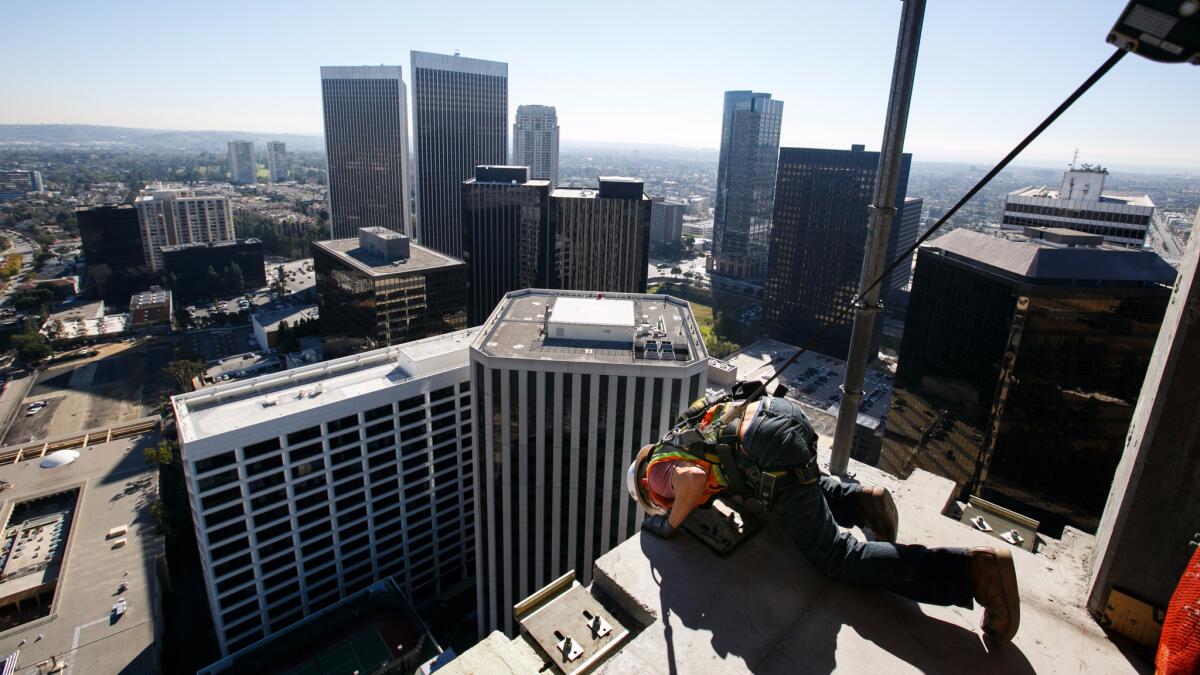California’s housing shortage will hamper the economy, reports say

- Share via
The dearth of housing in California will put a drag on the state’s economic growth, according to two new studies.
California will continue to pile on jobs in 2017, but its advantage over the rest of the country will shrink in the future, say a report from UC Riverside and another from UCLA.
The state cannot continue to grow as fast as it has in recent years, said economists who wrote the reports, unless it funnels more people into the workplace. But there aren’t enough homes in the state to accommodate a wave of new workers.
“Long-run growth is a function of the number of bodies in your economy,” said Chris Thornberg, an economist and the coauthor of the UC Riverside report released Tuesday.
“If we aren’t going to build new housing to meet demand, we are going to limit population growth and limit economic growth.”
Part of the problem is a slump in residential construction. In the first half of this year, new housing permits totaled 2% fewer than in 2015, and multifamily permits were down 11%, the report said.
California is nearing full employment, which is when nearly everyone who wants a job has one. The unemployment rate has hovered just above 5% for the last several months.
That means that there are fewer and fewer people already in the state to recruit into the labor market, which will naturally tamp down on the economy, according to the UCLA report released Wednesday.
“The high cost of living in California discourages some migration to the state,” said Jerry Nickelsburg, an economist and the coauthor of the UCLA Anderson Forecast.
The median price for a home in Los Angeles is $615,000, compared with $1.19 million in San Francisco, according to Redfin, the real estate website.
The state will add jobs at a rate of 2% in 2016, but it will slow to 1.7% in 2017 and 1.1% in 2018, the report said.
“It sounds like it’s a bad thing, but it’s actually a decision by Californians to restrict the rapidity of growth,” Nickelsburg said. “Additional migration means more congestion and more pollution.”
Republican presidential nominee Donald Trump’s aggressive posturing on trade represents another potential headwind for California, Nickelsburg said.
If Trump’s policies toward China and Mexico, for example, lead to a trade war with those countries, California would suffer more than other states because California is so reliant on the flow of goods through its ports and across the southern border.
Nickelsburg said a Trump-led trade war could undercut employment growth in the state by more than 20%.
Follow me @NatalieKitro on Twitter
ALSO
Hackers steal Westpark Capital files, demand ransom for data
SeaWorld bets $175 million on new orca shows and virtual-reality attractions
First Clinton-Trump matchup breaks presidential debate record with 84 million TV viewers
More to Read
Inside the business of entertainment
The Wide Shot brings you news, analysis and insights on everything from streaming wars to production — and what it all means for the future.
You may occasionally receive promotional content from the Los Angeles Times.











